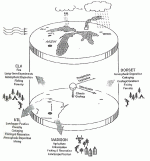Extending our understanding of how individual lakes and lake districts work to larger regional and global scales is a challenge made somewhat easier by a developing relationship between the North Temperate Lakes LTER (NTL) and strong groups of limnological researchers in Canada and around the globe. In our intersite project we are attempting to obtain a general understanding of:
- Ecological variability and the organization of lake districts
- Species turnover of plankton and fishes in lakes as islands
- Lake ice phenology as a tool for analysis of climate change and variability in the northern hemisphere
We have long recognized the leadership in long-term research that has come from Canadian lake scientists. Both participating Canadian sites have long-term data on a number of lakes, strong groups of internationally respected researchers, and a desire to extend the geographic scope of their syntheses.
As a first step, NTL researchers interacted in a three-day synthesis workshop at Trout Lake Station in January 1995 with researchers from the Experimental Lakes Area (ELA) in Western Ontario (Dr. Robert Hecky, Canadian Freshwater Institute, Winnepeg) and the Dorset Research Centre (Dr. Peter Dillon) in central Ontario. Twenty two scientists participated, 12 from NTL and five from each Canadian site.
We have begun sharing data, conducting synthetic analyses, and designing multi-authored manuscripts. Approaches to and responsibilities for six manuscripts have been developed:
- Temporal and spatial controls on water transparency in north temperate lakes
- Local and regional factors controlling limnological responses to drought
- Regional versus local controls on the transmission of variances in lake ecosystems
- Temporal coherence patterns in climate and water temperature across the Great Lakes Region
- Local and regional controls on species turnover rates for zooplankton
- Temporal and spatial patterns of lake ice phenology in eastern North America
These interactions may well encourage wider interaction between LTER and Canadian long-term research and monitoring sites. They may also prove to be pragmatic testing grounds for generalizing to the global levels of understanding sought through the fledgling International Long-Term Ecological Research (ILTER) network.

 Enlarge this image
Enlarge this image